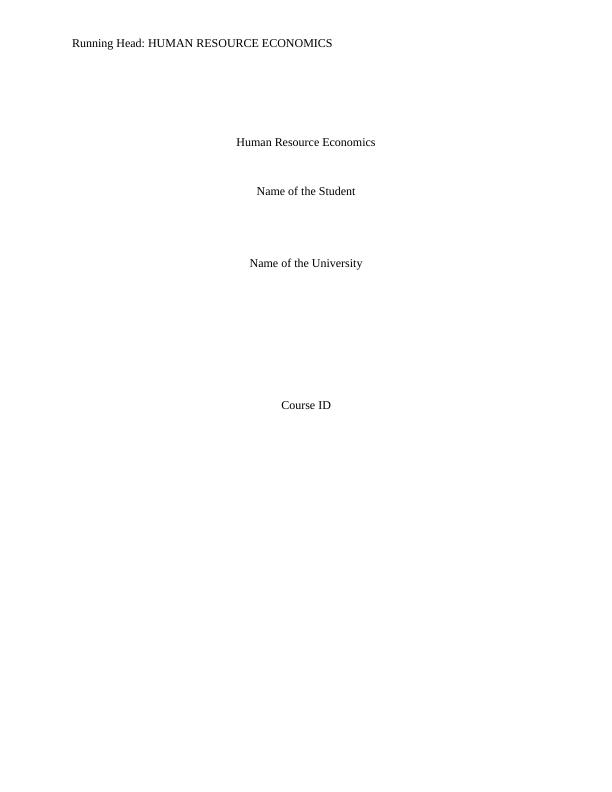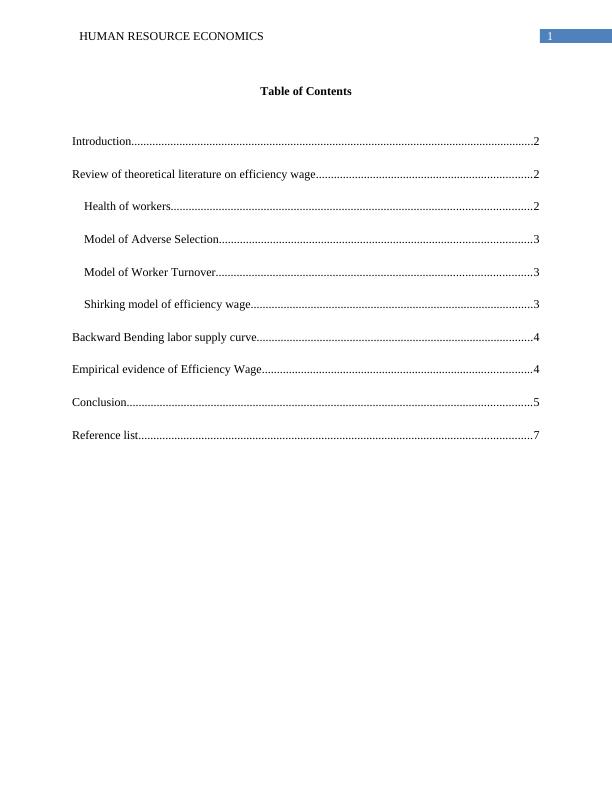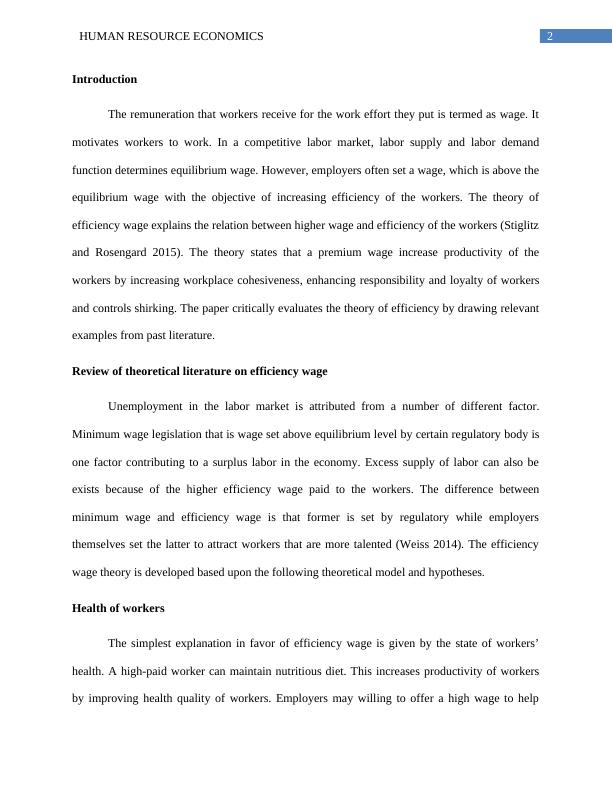Efficiency Wage Theory: A Critical Evaluation
Added on 2023-06-10
8 Pages1541 Words491 Views
Running Head: HUMAN RESOURCE ECONOMICS
Human Resource Economics
Name of the Student
Name of the University
Course ID
Human Resource Economics
Name of the Student
Name of the University
Course ID

1HUMAN RESOURCE ECONOMICS
Table of Contents
Introduction......................................................................................................................................2
Review of theoretical literature on efficiency wage........................................................................2
Health of workers........................................................................................................................2
Model of Adverse Selection........................................................................................................3
Model of Worker Turnover.........................................................................................................3
Shirking model of efficiency wage..............................................................................................3
Backward Bending labor supply curve............................................................................................4
Empirical evidence of Efficiency Wage..........................................................................................4
Conclusion.......................................................................................................................................5
Reference list...................................................................................................................................7
Table of Contents
Introduction......................................................................................................................................2
Review of theoretical literature on efficiency wage........................................................................2
Health of workers........................................................................................................................2
Model of Adverse Selection........................................................................................................3
Model of Worker Turnover.........................................................................................................3
Shirking model of efficiency wage..............................................................................................3
Backward Bending labor supply curve............................................................................................4
Empirical evidence of Efficiency Wage..........................................................................................4
Conclusion.......................................................................................................................................5
Reference list...................................................................................................................................7

2HUMAN RESOURCE ECONOMICS
Introduction
The remuneration that workers receive for the work effort they put is termed as wage. It
motivates workers to work. In a competitive labor market, labor supply and labor demand
function determines equilibrium wage. However, employers often set a wage, which is above the
equilibrium wage with the objective of increasing efficiency of the workers. The theory of
efficiency wage explains the relation between higher wage and efficiency of the workers (Stiglitz
and Rosengard 2015). The theory states that a premium wage increase productivity of the
workers by increasing workplace cohesiveness, enhancing responsibility and loyalty of workers
and controls shirking. The paper critically evaluates the theory of efficiency by drawing relevant
examples from past literature.
Review of theoretical literature on efficiency wage
Unemployment in the labor market is attributed from a number of different factor.
Minimum wage legislation that is wage set above equilibrium level by certain regulatory body is
one factor contributing to a surplus labor in the economy. Excess supply of labor can also be
exists because of the higher efficiency wage paid to the workers. The difference between
minimum wage and efficiency wage is that former is set by regulatory while employers
themselves set the latter to attract workers that are more talented (Weiss 2014). The efficiency
wage theory is developed based upon the following theoretical model and hypotheses.
Health of workers
The simplest explanation in favor of efficiency wage is given by the state of workers’
health. A high-paid worker can maintain nutritious diet. This increases productivity of workers
by improving health quality of workers. Employers may willing to offer a high wage to help
Introduction
The remuneration that workers receive for the work effort they put is termed as wage. It
motivates workers to work. In a competitive labor market, labor supply and labor demand
function determines equilibrium wage. However, employers often set a wage, which is above the
equilibrium wage with the objective of increasing efficiency of the workers. The theory of
efficiency wage explains the relation between higher wage and efficiency of the workers (Stiglitz
and Rosengard 2015). The theory states that a premium wage increase productivity of the
workers by increasing workplace cohesiveness, enhancing responsibility and loyalty of workers
and controls shirking. The paper critically evaluates the theory of efficiency by drawing relevant
examples from past literature.
Review of theoretical literature on efficiency wage
Unemployment in the labor market is attributed from a number of different factor.
Minimum wage legislation that is wage set above equilibrium level by certain regulatory body is
one factor contributing to a surplus labor in the economy. Excess supply of labor can also be
exists because of the higher efficiency wage paid to the workers. The difference between
minimum wage and efficiency wage is that former is set by regulatory while employers
themselves set the latter to attract workers that are more talented (Weiss 2014). The efficiency
wage theory is developed based upon the following theoretical model and hypotheses.
Health of workers
The simplest explanation in favor of efficiency wage is given by the state of workers’
health. A high-paid worker can maintain nutritious diet. This increases productivity of workers
by improving health quality of workers. Employers may willing to offer a high wage to help

End of preview
Want to access all the pages? Upload your documents or become a member.
Related Documents
Efficiency Wage Theory: How Higher Wages Affect Worker Productivitylg...
|15
|4199
|58
Human resource economics PDFlg...
|10
|2297
|159
Effectiveness of Pay for Performancelg...
|17
|4862
|146
Efficiency Wage Theory and Minimum Wage: An Economic Assignmentlg...
|8
|1564
|381
Report on Human Resource Economicslg...
|12
|2633
|250
Relationship between Higher Wages and Efficiency in Agricultural Sectorlg...
|5
|1031
|334
